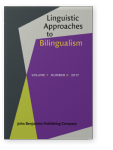Commentary
Comparison as a fruitful way forward
Bilinguals, co-activation, and interfaces
References (13)
Genesee, F., & Delcenserie, A.
Genesee, F., & Nicoladis, E.
(
2007)
Bilingual first language acquisition. In
E. Hoff, &
M. Shatz (Eds.),
Handbook of language development (pp. 324–342). Malden, MA: Blackwell.

Kupisch, T., & Rothman, J.
(
2016)
Terminology matters! Why difference is not incompleteness and how
early child bilinguals are heritage speakers.
International Journal of Bilingualism.


Lorenzen, B., & Murray, L.
(
2008)
Bilingual aphasia: A theoretical and clinical
review.
American Journal of Speech Language Pathology, 171, 299–317.


Meisel, J. M.
(
2011)
Bilingual language acquisition and theories of diachronic change:
Bilingualism as cause and effect of grammatical change.
Bilingualism: Language and Cognition, 14(2), 121–145.


Montrul, S.
(
2016)
The acquisition of heritage languages. Cambridge: Cambridge University Press.


Muysken, P.
(
2000)
Bilingual speech: A typology of code-mixing. Cambridge: Cambridge University Press.

Rothman, J., Cabrelli Amaro, J., & de Bot, K.
(
2013)
Third language acquisition. In
J. Herschensohn, &
M. Young Scholten (Eds.),
Cambridge handbook of second language acquisition (pp. 372–393). Cambridge: Cambridge University Press.


Schwartz, B. D.
(
2004)
On child L2 development of syntax and morphology.
Lingue e Linguaggio, 3(1), 97–132.

Cited by (1)
Cited by 1 other publications
Dorado Escribano, Guadalupe
2020.
Atrición lingüística, ¿término correcto para este “nuevo” fenómeno lingüístico?.
Pragmática Sociocultural / Sociocultural Pragmatics 8:2
► pp. 159 ff.

This list is based on CrossRef data as of 5 july 2024. Please note that it may not be complete. Sources presented here have been supplied by the respective publishers.
Any errors therein should be reported to them.
